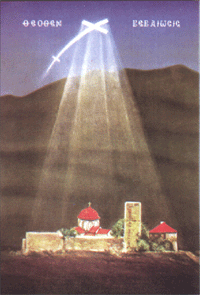 |
|
THE APPEARANCE OF THE CROSS
NEAR ATHENS IN 1925

IN THE EARLY 1900’s, and especially in the 1920’s, there were strong anti-Church and secularist forces in power in Greece and in the Ecumenical Patriarchate. Among the actions of these forces, there was introduced, by force, the Gregorian calendar. The Gregorian calendar is adequate for the functions of business, the stock-exchange, and other worldly, secular activities. Liturgically, however, it is practically useless, even harmful. It is in no way possible to reconcile the Gregorian calendar with our canonical, Orthodox Christian Paschalion. Moreover, the introduction of a Church calendar change by a local church created an unacceptable liturgical disunity within the Church Itself.
Vast numbers of the people of Greece refused to accept these anticanonical, anti-Church changes being forced upon them by state police power. Such people suffered, and continue to suffer persecution, imprisonment and deprivation at the hands of secular police powers. But the spiritual eyes of true Orthodox Christians saw clearly even if, at the time, they did not completely comprehend the evil of the new calendar. It was a forerunner and a sign of the greatest heresy in the history of the world—Ecumenism. Many people, however, became confused. Some began to waver. Just as the Arians were in control of the worldly power in 351 and were able to force their heresy upon the empire, so now, the calendar renovationists controlled the worldly power of Greece. In such a troubled and dangerous time, the All-Merciful God heeded the needs of His people. Again, as in 351, God sent a wondrous apparition of the sign of the All-Honourable Cross to seal the truth and put the false teachers to shame.
The appearance of the sign of the Cross took place in this manner:
In 1925, on the eve, of the feast of the Exaltation of the All-Honourable and Life-giving Cross of our Saviour, 14 September according to the Orthodox Church calendar, the all-night vigil was served at the church of St. John the Theologian in suburban Athens. By 9 o’clock that evening, more than 2,000 of the true-Orthodox faithful had gathered in and around the church for the service, since very few true-Orthodox churches had been accidentally left open by the civil authorities. Such a large gathering of people could not, however, go unnoticed by the authorities. Around eleven P.M. the authorities dispatched a battalion of police to the church “to prevent any disorders which might arise from such a large gathering.” The gathering was too large for the police to take any direct action or to arrest the priest at that time and so they joined the crowd of worshippers in the already over-flowing courtyard of the church.
Then, regardless of the true motives for their presence, against their own will, but according to the Will which exceeds all human power, they became participants in the miraculous experience of the crowd of believers.
At 11:30 P.M., there began to appear in the heavens above the church, in the direction of North-East, a bright, radiant Cross of light. The light not only illuminated the church and the faithful but, in its rays, the stars of the clear, cloudless sky became dim and the church-yard was filled with an almost tangible light. The form of the Cross itself was an especially dense light and it could be clearly seen as a Byzantine cross with an angular cross bar toward the bottom. This heavenly miracle lasted for half an hour, until midnight, and then the Cross began slowly to raise up vertically, as the cross in the hands of the priest does in the ceremony of the Elevation of the Cross in church. Having come straight up, the Cross began gradually to fade away.
The human language is not adequate to convey what took place during the apparition. The entire crowd fell prostrate upon the ground with tears and began to sing prayers, praising the Lord with one heart and one mouth. The police were among those who wept, suddenly discovering, in the depths of their hearts, a childlike faith. The crowd of believers and the battalion of police were transformed into one, unified flock of faithful. All were seized with a holy ecstasy. T
he vigil continued until four A.M., when all this human torrent streamed back into the city, carrying the news of the miracle because of which they were still trembling and weeping.
Many of the unbelievers, sophists and renovationists, realizing their sin and guilt, but unwilling to repent, tried by every means to explain away or deny this miracle. The fact that the form of the cross had been so sharply and clearly that of the Byzantine (sometimes called the Russian Cross) Cross, with three cross-bars, the bottom one at an angle, completely negated any arguments of accidental physical phenomenon.
The fact that such an apparition of the Cross had also occurred during the height of the first great heresy must strike the Orthodox with an especial sense of the magnitude of the importance of the calendar question and of all that is connected with it. No sensible person can discuss this issue lightly, with secular reasoning or with worldly arguments. Renovationists, like the Arians in 351, are left without extenuation or mitigation.
---
Taken from Orthodox Life, Vol. 22, No. 2 (March-April, 1972), pp. 18-20, Published by Holy Trinity Monastery, Jordanville, New York.
|
Archbishop Gregory Dormition Skete P.O. Box 3177 Buena Vista, CO 81211-3177 USA |
Contact: Archbishop Gregory
In a New Window. |
|
|
Copyright 2005 All rights reserved. |
